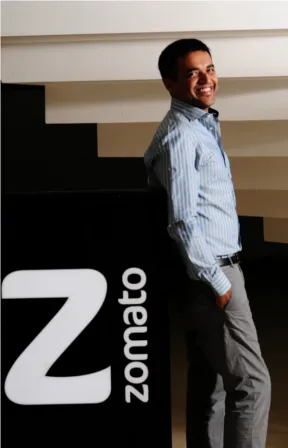From starting up in a living room to 650 strong: A look at Zomato's focus on team dynamics

Online restaurant guide Zomato has been the latest sensation in the Indian startup ecosystem. Zomato has raised more than $50 million in multiple rounds till date and is valued at $161 million (is the funding justified?). Founded by Deepinder Goyal back in 2008 as Foodiebay, the company underwent a pivot to find a scalable and commercially viable model. The first round of funding worth $1 million was raised from InfoEdge in August 2010 and there has been no looking back since then. Zomato went international in September 2012, broke even in India and is now present in 11 countries. The team size has also swelled to 650. In this interview with Deepinder Goyal, YourStory talks to him about the dynamics in such a high growth environment. YourStory: From a small setup to achieving scale quickly, Zomato has gone through a curve. What are the biggest changes in terms of the setup and processes?
Deepinder Goyal: If there is one aspect that defines us as an organisation it is that we are always looking for ways to outdo ourselves. We started out of a living room and now five years on, we have massively scaled our operations to a 650-strong team, with presence in 40 cities across 11 countries and covering over 206,300 restaurants worldwide. A challenge that comes with establishing and growing a startup is to find the right people to work with. Not everyone fits in culturally, and unfortunately that is something we learnt over time and have worked on tweaking our hiring strategy. When we’re making a hire, we look beyond technical capabilities and skills. We look at a person’s attitude and hire people who can take ownership of their work, have a passion to learn and grow and take the company forward.
To keep our users engaged and happy, we are constantly improving our service and of course, our product. Since we started out in 2008, our product has evolved beyond just providing restaurant information and now allows for increased interaction between users. We make sure that in every new market we enter, we customize the product to suit that market. Having said that, keeping users engaged and maintaining a rock-solid content platform are at the core of our product, and we are extremely passionate about being at the heart of creating a global foodie network and culture.
YS: As an entrepreneur, what helped you the most through this shift?
DG: Right from day one, we’ve believed in our product and having a fantastic team that believes in putting out the best work has got us to where we are today. Focusing on the goal and persistence in getting things done have helped tremendously over the past five years. The response that we have received has been overwhelming; it has encouraged us to sustain our performance over time.
YS: What are the challenges you face at present?
DG: Scaling up invariably brings its own difficulties - finding the right people for the right role being one of them. It can’t be stressed enough how important it is to have people in your team who are aware of and understand what you’re trying to achieve as a company. We don’t compromise on our values when we interview people to fill roles across the board, and we can proudly say that we have some of the coolest and brightest people working with us. We look beyond just technical capabilities when interviewing candidates and try to gauge whether they’ll fit into the team culturally.
The other thing we need to be proactive about is the information on our website. Users will only find it useful if the data is comprehensive and up-to-date. The challenge lies in making sure that we have every restaurant in a particular city covered, with updated information.
YS: Any tradeoffs that came with the quick scale?
DG: The one tradeoff you never want to make with a quick scale is your organization’s culture. Our team has grown dramatically over the past 18 months, and we’re now over 650 people across 11 countries. Like I said, we’re always looking for the right people for our team, and the culture barrier is set very high. We’re okay with turning down a candidate with an impressive CV if we feel they won’t gel well with the team - this is in line with our ‘short-term sacrifice for long-term gain’ belief. That said, we’re a very close-knit team despite the many miles and time zones in between, and it helps to have an open-communication culture across the board.
Website: Zomato







